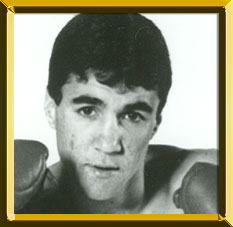Fenech was born in Sydney, New South Wales, Australia and was one of the toughest and hardest working fighters of his era. The kid from the tough, Marrickville section of Sydney was named captain of the Australian boxing team at the 1984 Olympic games, but suffered a controversial defeat (the decision was reversed by judges after the fight). He returned home and turned pro later that October.
As a pro, his career seemed to match his fighting style. The supremely conditioned fighter swarmed opponents from the opening bell and didn't stop throwing punches until the referee intervened or the final bell. He won titles in three weight divisions in the span of 20 fights in just 3 1/2 years.
The "Marrickville Mauler" captured the IBF bantamweight title on April 26, 1985 in his seventh fight, with a one-sided, ninth-round TKO over champion Satoshi Shingaki of Thailand before a hometown crowd in Sydney. He defended the bantamweight crown three times, including a rematch win over Shingaki (TKO 4) and a 14th round TKO over 1984 Olympic champion Steve McCrory of the United States.
He won his second title May 8, 1987. Fenech attacked WBC super bantamweight champion Samart Payakaroon from the opening bell and turned in another signature performance. He steadily wore down the champion before the referee stepped in and stopped the contest in the fourth round. In July he defeated American Greg Richardson (TKO 5) and in Oct. met future Hall of Famer Carlos Zarate of Mexico. The two greats battled before a sellout crowd in Sydney. Fenech took an early lead on the scorecards, but he suffered a deep wound above his eye in Round 4 and was awarded a technical win when he was no longer able to continue.
One battle Fenech couldn't win was on the scales and was forced to move up to featherweight. On March 7, 1988 he weathered an early barrage from Puerto Rico's Victor Callejas, himself a former champion, and captured his third world title via 10th-round TKO. By defeating Callejas for the vacant WBC featherweight crown, Fenech became the first undefeated fighter to win titles in three divisions.
Throughout his career Fenech was saddled with brittle hands, which caused him great pain. Sighting the pain in his hands, Fenech hung up his gloves after defeating Marcos Villasana (W 12) in his third defense of the featherweight belt, April 8, 1988. But the retirement was short-lived. Following surgery to his hands, Fenech returned to the ring that Nov. with a 12-round decision over Mario Martinez. In Jan. he stopped Johnny Kalbhenn in four rounds and was ready for his fourth title.
He would return to the United States, the scene of his last defeat, for his challenge of WBC super featherweight champion Azumah Nelson of Ghana. On June 28, 1991 in Las Vegas, Fenech attacked Nelson, a well-schooled boxer who himself was a two-division champion, from the opening bell. Fenech seemed to dominate the fight and often had Nelson pinned against the ropes. In Round 12, Fenech staggered the champion, but was unable to finish him off. The Australian was shocked and heartbroken when the fight was declared a draw.
It was the last great effort from Fenech. The numerous brawling wars over the years had taken their toll. Before a crowd of 35,000 at Princes Park in Melbourne, Fenech found himself on the short side of a signature Nelson performance. Nelson dropped Fenech in each of the first two rounds. He dominated the fight and had Fenech defenseless before the referee intervened in Round 8.
He attempted two more comebacks, but both ended inside the distance. He retired in 1996. In June 2008, Fenech entered the ring to engage in a third bout with rival Nelson, scoring a 10-round majority decision in Melbourne.
Born: May 28, 1964
Bouts: 32
Won: 28
Lost: 3
Draw: 1
KOs: 21
Induction: 2002
Courtesy of The Ring
Jeff Fenech

